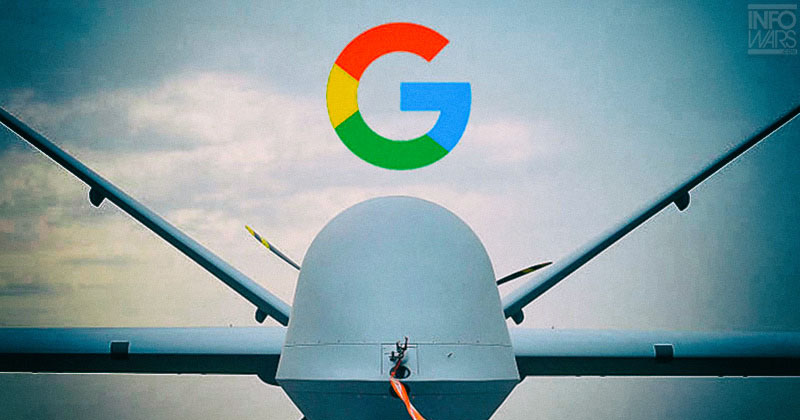Hari Sreenivasan: Artificial intelligence, drones, warfare, and Google. It's a mixture that caused an uproar inside the tech giant where the early motto was don't be evil. So what's behind Google's contract with the Department of Defense for a project called Maven? Joining me now from Oakland is Gizmodo reporter Kate Conger who has been covering the story. Kate, so what was the extent of what google was planning to do and work with on this project Maven?
Kate Conger: So Google's role in this project has been to create artificial intelligence to do image classification on the footage collected by drones, and so they were trying to help the Department of Defense mark objects in this footage to say this car is a car, this building is a building, this is a person.
Hari Sreenivasan: Okay. And the employees at google had a problem with this for the past several weeks, but how did they protest it? What was their concern? So there are a couple of different concerns within the employees. Some employees at google feel like the company shouldn't be involved with the military at all. There are other employees that feel that using artificial intelligence in this context is particularly risky. They foresee a future where eventually you have a computer making the decision of whether or not to carry out a drone strike, and they feel like a human should be the one who is making that decision, not a computer. And so there's been a few things they have done to push back and protest. There was an open letter they sent around the company asking google to cancel the contract and obviously they have been speaking to the press about some of their objections as well.
Hari Sreenivasan: Have google executives been thinking about this? You have obtained some e-mails, what was the chatter among the C suite? The executive conversation was really interesting. When they first took on this project, there were a lot of conversation about the concern of how the public would perceive this, and particularly in the use of A.I. in a military context. There is a lot of conversation back and forth of, you know, how are we going to shape public perception about this? How is this going to reflect on our image? But there wasn't as much conversation about the actual ethics of this kind of decision and that ethical conversation is the one that employees have really been pushing for.
Hari Sreenivasan: And how big of a part of Google's revenue or how significant a line of business is this to google?

Kate Conger: So the Maven contract itself is not particularly significant for google. I believe the earliest numbers they had was around 15 million, and for google that is not very much money at all. But the idea was that this would sort of be a foot in the door for them with future military contracts and could put them into the running for much, much larger contracts down the road.
Hari Sreenivasan: If google doesn't do this, will other or are other companies lobbying for these contracts?
Kate Conger: Yes. So the Maven contract was a competition between a couple of other major cloud providers and it is entirely likely that one of those other companies will step up and fill google's shoes once their contract expires in 2019.
Hari Srinivasan: So google decided they are not going to renew this in 2019, meaning they are still continuing to work on this project. Are there ripple effects going forward for some of the employees that are still concerned and inside google today?
Kate Conger: I believe so. I think that the employee push back on this will continue, employees have said from the beginning they want the contract to be canceled and that is not what has happened so far. Google says they will finish out the contract. And so I expect the employees will probably continue to push back on Google's involvement in this.
Hari Srinivasan: Is there a larger conversation that is happening among tech companies about how they should be working with or not working with the U.S. government?
Kate Conger: I think so. You know, there has been a lot of reckoning throughout the tech industry over the last year or so where employees are kind of wondering about how the products that they create are being used. You know, you see this at Facebook in the wake of the Cambridge Analytical scandal, I think you see this with Twitter a little bit with some of the trolling and harassment that's gone on there, and of course with google in this military contract there is a lot of questioning about, you know, what are we are creating here, is it fundamentally going to be used for good or is it not?
Hari Sreenivasan: All right, Kate Conger of Gizmodo, joining us from Oakland, thank you so much.
Kate Conger: Thank you.












